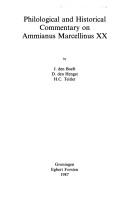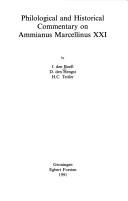| Listing 1 - 8 of 8 |
Sort by
|
Book
Year: 2018 Publisher: Frankfurt a.M. PH02
Abstract | Keywords | Export | Availability | Bookmark
 Loading...
Loading...Choose an application
- Reference Manager
- EndNote
- RefWorks (Direct export to RefWorks)
Die vorliegende Studie geht der heiklen Frage nach, ob und wie der Nutzen einer öffentlichen Maßnahme gemessen werden kann, die ein Umweltrisiko vermindert. Dazu werden in einer wohlfahrtstheoretischen Analyse testbare Hypothesen über die Wertschätzung einer solchen Maßnahme abgeleitet. Mit Hilfe des auf einer strukturierten Befragung aufbauenden kontingenten Bewertungsansatzes wird die Wertschätzung der Bürger der risikovermindernden Maßnahme im Durchschnitt einen weit über ihre Kosten hinausgehenden Nutzen beimessen, sondern es wird auch auf Grund einer ökonometrischen Analyse der Einzelgebote (Schätzung multipler Zahlungsbereitschaftfunktionen) gezeigt, daß die erfaßten Wertschätzungen in vergleichsweise hohem Maß valide sind, der Nutzen Umweltrisiken vermindernder Maßnahmen also zumindest in der Tendenz abschätzbar ist.
Anwendung --- Bewertungsansatzes --- Bürgern --- Eine --- eines --- Giftmüllrisiko --- kontingenten --- Risikos --- Römer --- Verminderung --- wert?
Book
ISBN: 022643852X Year: 2018 Publisher: Chicago : University of Chicago Press,
Abstract | Keywords | Export | Availability | Bookmark
 Loading...
Loading...Choose an application
- Reference Manager
- EndNote
- RefWorks (Direct export to RefWorks)
More than just colorful clickbait or pragmatic city grids, maps are often deeply emotional tales: of political projects gone wrong, budding relationships that failed, and countries that vanished. In Map Men, Steven Seegel takes us through some of these historical dramas with a detailed look at the maps that made and unmade the world of East Central Europe through a long continuum of world war and revolution. As a collective biography of five prominent geographers between 1870 and 1950-Albrecht Penck, Eugeniusz Romer, Stepan Rudnyts'kyi, Isaiah Bowman, and Count Pál Teleki-Map Men reexamines the deep emotions, textures of friendship, and multigenerational sagas behind these influential maps. Taking us deep into cartographical archives, Seegel re-creates the public and private worlds of these five mapmakers, who interacted with and influenced one another even as they played key roles in defining and redefining borders, territories, nations-and, ultimately, the interconnection of the world through two world wars. Throughout, he examines the transnational nature of these processes and addresses weighty questions about the causes and consequences of the world wars, the rise of Nazism and Stalinism, and the reasons East Central Europe became the fault line of these world-changing developments. At a time when East Central Europe has surged back into geopolitical consciousness, Map Men offers a timely and important look at the historical origins of how the region was defined-and the key people who helped define it.
Geographers --- Penck, Albrecht, --- Romer, Eugeniusz, --- Rudnyt͡sʹkyĭ, Stepan, --- Bowman, Isaiah, --- Teleki, Pál, --- Psychohistory. --- Twentieth Century. --- World War I. --- cartography. --- geography.

ISBN: 1282604627 9786612604621 0472022768 9780472022762 0472086456 9780472086450 0472904175 Year: 2000 Publisher: Ann Arbor : University of Michigan Press,
Abstract | Keywords | Export | Availability | Bookmark
 Loading...
Loading...Choose an application
- Reference Manager
- EndNote
- RefWorks (Direct export to RefWorks)
Describes the legal challenge to the Colorado anti-gay civil rights initiative.
Equality before the law --- Gay rights --- Gays --- Gay people --- Gay persons --- Homosexuals --- Persons --- Gay and lesbian rights --- Gay men --- Lesbian rights --- Lesbians --- Rights of gays --- Rights of lesbians --- Civil rights --- Equal protection of the law --- Equal rights --- Justice --- Equal rights amendments --- Legal status, laws, etc. --- Evans, Richard G. --- Romer, Roy,
Book
ISBN: 0271096136 0271096144 0271094842 Year: 2023 Publisher: University Park, PA : The Pennsylvania State University Press,
Abstract | Keywords | Export | Availability | Bookmark
 Loading...
Loading...Choose an application
- Reference Manager
- EndNote
- RefWorks (Direct export to RefWorks)
Known as the "swing justice," Justice Anthony M. Kennedy provided the key vote determining which way the Supreme Court would decide on some of the most controversial cases in US history. Though criticized for his unpredictable rulings, Kennedy also gained a reputation for his opinion writing and, more so, for his legal rhetoric.This book examines Justice Kennedy's legacy through the lenses of rhetoric, linguistics, and constitutional law. Essays analyze Kennedy's opinion writing in landmark cases such as Romer v. Evans, Obergefell v. Hodges, and Planned Parenthood v. Casey. Using the Justice's rhetoric as an entry point into his legal philosophy, this volume reveals Kennedy as a justice with contradictions and blind spots-especially on race, women's rights, and immigration-but also as a man of empathy deeply committed to American citizenship.A sophisticated assessment of Justice Kennedy's jurisprudence, this book provides new insight into Kennedy's legacy on the Court and into the role that rhetoric plays in judging and in communicating judgment.In addition to the editors, the contributors to this volume are Ashutosh Bhagwat, Elizabeth C. Britt, Martin Camper, Michael Gagarin, James A. Gardner, Eugene Garver, Leslie Gielow Jacobs, Sean Patrick O'Rourke, Susan E. Provenzano, Clarke Rountree, Leticia M. Saucedo, Darien Shanske, Kathryn Stanchi, and Rebecca E. Zietlow.
Judges --- Judgments --- Citizens United v. FEC. --- Classical Rhetoric. --- Judging Well. --- Justice Anthony Kennedy. --- Lawrence v. Texas. --- Legal rhetoric. --- Natural Law. --- Obergefell v. Hodges. --- Planned Parenthood v. Casey. --- Rhetoric of the law. --- Rhetorical Knowledge. --- Romer v. Evans. --- SCOTUS. --- Supreme Court of the United States. --- US politics. --- jurisprudence. --- legal history.
Book
ISBN: 9048551242 9048527449 9789048527441 9789089648808 9089648801 9789048551248 Year: 2017 Volume: 4 Publisher: Amsterdam: Amsterdam university press,
Abstract | Keywords | Export | Availability | Bookmark
 Loading...
Loading...Choose an application
- Reference Manager
- EndNote
- RefWorks (Direct export to RefWorks)
Traditional scholarship on post-Roman western culture has tended to examine the ethnic identities of Goths, Franks, and similar groups while neglecting the Romans themselves, in part because modern scholars have viewed the concept of being Roman as one denoting primarily a cultural or legal affiliation. As this book demonstrates, however, early medieval 'Romanness' also encompassed a sense of belonging to an ethnic group, which allowed Romans in Iberia and Gaul to adopt Gothic or Frankish identities in a more nuanced manner than has been previously acknowledged in the literature.
Ethnology --- Cultural anthropology --- Ethnography --- Races of man --- Social anthropology --- Anthropology --- Human beings --- Romans. --- Gauls. --- Franks. --- Germanic peoples --- Celts --- Italic peoples --- Latini (Italic people) --- Ethnische Identität. --- Ethnology. --- Franken --- Gallier. --- Goten. --- Römer. --- Europe --- Franken. --- Gallien. --- Iberische Halbinsel. --- Rome (Empire). --- Spain. --- Spanien. --- Romans --- Gauls --- Franks --- Identité collective --- --Ethnologie --- --Rome ancienne --- --Espagne --- --Gaule --- --Gaulois --- --Romains --- --Francs, peuplade --- --Franks. --- Late Antiquity, ethnicity, Romans, Visigoths, Franks. --- Ethnology - Rome --- Ethnology - Spain --- Ethnology - Gaul --- Ethnologie --- Rome ancienne --- Gaulois --- Romains --- Francs, peuplade --- Espagne --- Gaule
Book
ISBN: 1644698706 1644698684 9781644698716 1644698714 9781644698709 9781644698686 9781644698693 Year: 2022 Publisher: Boston
Abstract | Keywords | Export | Availability | Bookmark
 Loading...
Loading...Choose an application
- Reference Manager
- EndNote
- RefWorks (Direct export to RefWorks)
Seven haunting portraits of WWII refugees motivated Akira Kitade to identify the individuals portrayed. Were they among the thousands rescued by Chiune Sugihara's life-saving Japanese transit visas? In this account of his investigation, Kitade uncovers more saviors, including the Dutch diplomat Jan Zwartendijk, and provides new insights about Sugihara visas.
Righteous Gentiles in the Holocaust --- World War, 1939-1945 --- HISTORY / Holocaust. --- European War, 1939-1945 --- Second World War, 1939-1945 --- World War 2, 1939-1945 --- World War II, 1939-1945 --- World War Two, 1939-1945 --- WW II (World War, 1939-1945) --- WWII (World War, 1939-1945) --- History, Modern --- Righteous of the nations (Judaism) --- Holocaust, Jewish (1939-1945) --- Jews --- Rescue --- Chiune Sugihara. --- Holocaust. --- Jan Zwartendijk. --- Jewish history. --- Refugees. --- Tadeusz Romer. --- World War II. --- Yad Vashem.

ISBN: 9069800128 9060880382 9069800861 9069801205 9004123350 9004142142 9789004162129 9789004180376 9789004215993 9004162127 9004180370 9789069800127 9789069800868 9789004142145 9781429452632 1429452633 9781433703928 1433703920 1280867507 9786610867509 Year: 1987 Publisher: Groningen: Forsten,
Abstract | Keywords | Export | Availability | Bookmark
 Loading...
Loading...Choose an application
- Reference Manager
- EndNote
- RefWorks (Direct export to RefWorks)
This is a commentary on Book XXV of the Res Gestae by the fourth century historian Ammianus Marcellinus. The commentary discusses philological, literary, linguistic and historical problems in the Latin text.
871 AMMIANUS MARCELLINUS
---
Latijnse literatuur--AMMIANUS MARCELLINUS
---
871 AMMIANUS MARCELLINUS Latijnse literatuur--AMMIANUS MARCELLINUS
---
Ammianus Marcellinus
---
Ammianus Marcellinus.
---
Valentinian
---
Valens,
---
Res gestae (Ammianus Marcellinus).
---
Ammianus,
---
Ammien Marcellin.
---
Valens
---
Valentinian,
---
Valentinien
---
Ammianus

ISBN: 9789004299955 9789004353817 9789004251496 9060880358 9060880528 906088065X 9069800446 9789069800868 9789069801209 9789004123359 9789004142145 9789004163461 9789004180376 9789004215993 9789004261532 9060880358 9060880528 906088065X 9069800446 9789069800868 9069801205 9004123350 9789004142145 9789004163461 9789004180376 9789069800448 9004163468 9789004162129 9004162127 9004180370 9004215999 9004299955 900435381X 9789060880722 9786611939878 1281939870 9047423992 9786611936709 1281936707 9047421515 9786613356932 1283356937 9004224025 9786612951466 900418838X 1282951467 9004300929 9004353828 9789004224025 9789060880654 9069800861 9789060880524 9789047423997 9781281939876 6611939873 9789047421511 9781281936707 661193670X 9789004188389 9781282951464 661295146X 9060880722 Year: 2007 Volume: 289 Publisher: Leiden: Brill,
Abstract | Keywords | Export | Availability | Bookmark
 Loading...
Loading...Choose an application
- Reference Manager
- EndNote
- RefWorks (Direct export to RefWorks)
This is the final volume in the series of commentaries on Ammianus' Res Gestae . The last book of Ammianus Marcellinus’ Res Gestae is the most important source for a momentous event in European history: the invasion of the Goths across the Danube border into the Roman Empire and the ensuing battle of Adrianople (378 CE), in which a Roman army was annihilated and the emperor Valens lost his life. Many contemporaries were of the opinion that this defeat heralded the decline of the Empire. Ammianus is sharply critical of the way Valens and his generals handled the military situation, but holds on to his belief in the permanence of Roma Aeterna , reminding his readers of earlier crises from which the Empire had recovered and pointing to the incompetence of the barbarians in siege craft.
Ammien Marcellin,
---
Constance
---
Julien,
---
Ammianus Marcellinus.
---
Langue
---
Histotriographie
---
Historiographie
---
Rome
---
Historiography.
---
Historiography
---
Ammianus,
---
Ammianus (Marcellinus).
---
Rerum gestarum libri (Ammianus Marcellinus).
---
Rome (Empire).
---
Historiographie.
---
284-476.
---
Histoire
---
History
---
Emperors
---
Biography
---
History and criticism
---
Biography.
---
Ammianus Marcellinus,
---
Valens,
---
Valentinian
---
textkritik.
---
Criticism, Textual.
---
Res gestae 18.
---
Geschiedschrijving.
---
Res gestae (Ammianus Marcellinus).
---
Ammianus Marcellinus
---
Ammien Marcellin.
---
Valens
---
Valentinian,
---
Valentinien
---
Ammianus
| Listing 1 - 8 of 8 |
Sort by
|

 Search
Search Feedback
Feedback About UniCat
About UniCat  Help
Help News
News